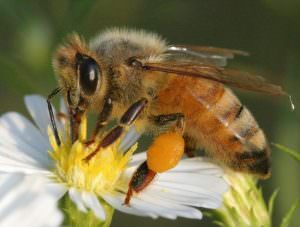The role pollinators play in our daily lives, and the simple way in which you can help to increase their numbers.
This week we celebrate the National Pollinator Week; a time to appreciate our pollinators’ work and spread the word about what you can do to protect and promote their ecosystems like pine forests, forest edges, gardens, city parks and meadows.

Did you know that without New Brunswick’s pollinators, such as the ruby throated hummingbirds, monarch butterflies and bumblebees, the Province’s farmers wouldn’t be able to sustain crops of strawberries, apples, cranberries and blueberries as well as a variety of other vegetables and fruits we share with our friends and family around the dinner table?
As avid garnders, we know you want to protect bees, moths an butterflies from harm — so in this blog we want to gently steer you towards purchasing neonicotinoid-free nurse plants.
The Province’s farmers, greenhouse operators, and major national chains are already guiding local planters towards a neonic free future. Individuals can do their part by planting pollinator friendly plants in their garden. Canadian Lillis, Red Trilliums, Veronicas, Starry False Salmo’s seals, Celandine Peppy, Goldenrod, New England Asters, Black Eyed Susan and Blue Flag Irises Roses, and Sunflowers are among the honey bee’s favorite plants.
As gardening season starts gearing up, you can easily find neonic free pollinator plants and support local businesses. Below is a list of retailers that sell neonic free products:
- David Smith’s Save a Native Plant Nursery – seeds and plants are neonic-free, they also offer a variety of New Brunswick native plants.
- Acadian Forest Restoration Nursery – all plants are neonic-free and provide a variety of New Brunswick’s native plants ;
- Scott’s Nursery –plants raised locally are neonic-free but they do not guarantee the same for imported plants;
- Home Depot: – 80% of their plants on-sell are neonic-free; plants with neonicotinoids are labelled;
- Canadian Tire: – no neonicotinoids plants are sold off-the-shelf;
- Home hardware: – distribution centers sell neonic-free products;
- Rona: – 95% of their plants are neonic-free; they also offer labels indicating the presence of neonicotinoids in the plants;
If you are a fan of gardening, here are some tips to protect and attract pollinators to your yard!
- Plant a diversity of plants. Flowers of different color, fragrance and season of bloom. Plants of different heights will attract different pollinator species.
- Leave sunny areas of ground mulch-free so pollinators can burrow
- Avoid the use of pesticides on your lawn and gardens.
- Provide bird and bat boxes as a resting area for larger pollinators.
